PET/CT and MRI Screening Guide for International Residents and Visitors
Our hospital offers cancer screening using PET/CT (FDG) scans and brain checkups using head MRI scans for international residents and visitors.
PET/CT Scan
We offer whole-body cancer screening using PET/CT (FDG) scans.
PET/CT (FDG) Cancer Screening
A PET/CT (FDG) scan uses a mechanism whereby cancer cells absorb glucose at a rate several times higher than that of normal cells. We can perform a whole-body cancer screening by injecting a glucose - like substance (FDG) into the body.

Please note that the accuracy is not 100%, as FDG can also accumulate in areas of inflammation or certain normal organs. In some cases, evaluating specific lesions may be difficult depending on their type, location, or size.
PET/CT Scans are Recommended for :
✔ Those who want early cancer detection
✔ Those with a family history of cancer
Not Suitable for PET/CT Scans
✔ Those with severe claustrophobia
✔ Those who have difficulty walking
independently
✔ Those who need assistance using the toilet
✔ Those with cognitive impairment
✔ Those who have had a seizure within the past year
✔ Those who are pregnant or may be pregnant
✔ Those who are breast feeding
Head MRI & PET/CT Scan
This course combines a PET/CT cancer screening with Brain screening, which includes a head MRI scan. A head MRI scan is an imaging test that uses magnetic fields and radio waves to examine the brain. It provides detailed cross-sectional images and is an effective tool for the early detection of brain-related conditions. The purpose of brain screening is the early detection and prevention of conditions such as dementia, brain tumors, strokes, and cerebral hemorrhage.
At our hospital, the [Brain Screening + PET/CT Cancer Screening] includes both a head MRI and a PET/CT (FDG) scan, which are performed on the same day.
*Please note that we do not offer the head MRI as a standalone test, and the two scans on separate days. The head MRI is a non-contrast (plain) scan that does not use contrast agents.
Head MRI Scan
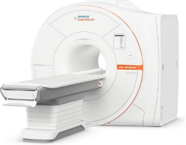 MRI (Magnetic Resonance Imaging) is a test that uses a strong magnet and radio waves to take detailed pictures of the inside of your body, such as your brain or organs.
MRI (Magnetic Resonance Imaging) is a test that uses a strong magnet and radio waves to take detailed pictures of the inside of your body, such as your brain or organs.
A head MRI shows detailed images of the brain and can help doctors find problems like tumors, strokes, or other changes early.
Benefits of Head MRI Scans
✔ Captures cross-sectional images of the brain from multiple angles
✔ Provides higher resolution than a CT scan for detailed brain evaluation
✔ Does not use radiation, eliminating exposure risks
Limitations of Head MRI Scans
✔ The scan takes place in a confined space and involves loud machine noise, which
may be uncomfortable for those who are claustrophobic or sensitive to noise.
✔ Due to the strong magnetic field, people with metal implants in their body may not
be eligible for the scan.
Head MRI Scans are recommended for:
✔ Those who want to detect cancer or cerebrovascular disease at an early stage
✔ Those with a family history of cancer
✔ Those with a family history of dementia, cerebral hemorrhage, cerebrovascular diseases or other vascular diseases
Not Suitable for Head MRI Scans
✔ Those with a pacemaker
✔ Those with an implanted cardioverter-defibrillator(ICD)
✔ Those with severe claustrophobia
✔ Those who have difficulty walking independently
✔ Those who need assistance using the toilet
✔ Those with cognitive impairment
✔ Those who have had a seizure within the past year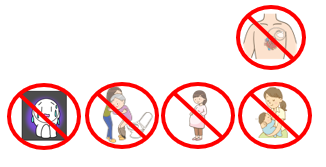
✔ Those who are pregnant or may be
pregnant
✔ Those who are breastfeeding
Please inform us before the scan if:
✔ You have metal implants in your body for medical treatment (e.g., cerebral artery clips, stents, artfitifical heart valves, artificial joints).
✔ You are using a medical device that contains magnets.
✔ You have, or you might have, metal fragments in your body due to an injury or accident.
✔ You use an insulin pump or a glucose monitor.
✔ You use a DIB cap (magnetic urinary catheter cap).
✔ You are using a nitroglycerin patch or nicotine patch.
✔ You have tattoos or permanent makeup
If any of the above apply to you, please check the relevant boxes on the screening application form and inform us in advance.
Screening Courses and Fees
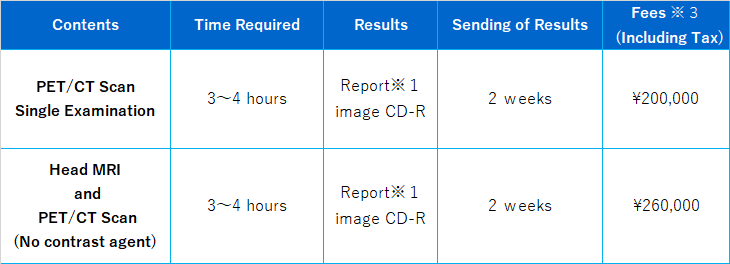
※1 The test results report will be provided in Japanese.
※2 The test results will be mailed to an address within Japan. Please provide the address at the time of application. If you prefer, the results can also be given in person at our hospital. Please inform us in advance.
※3 If you would like a doctor to explain the results, please contact us. Additional outpatient fees apply.
※4 If you cancel your appointment on the day for personal reasons, the full scan fee will be charged.
※5 If you have difficulty reading or writing Japanese, please bring someone who can speak Japanese with you. If this is not, the hospital can arrange an interpreter for a fee. As the number of interpreters is limited, please be sure to consult with us in advance.
Application
Applicant Side: Apply by email
Please download the “PET/CT(FDG)Cancer Screening Application Form” from the link below, fill in the required information, and send the completed form along with the necessary documents to the following email address:
✔ PET/CT (FDG) Cancer Screening Application Form
✔ Identification Document (Copy of Passport)
E-mail address: hok-impact@nms.ac.jp
The subject line: "Application for PET/CT (FDG) Cancer Screening"
Hospital Side: Screening Application Confirmation
Based on the information provided, we will determine whether the scan can be accepted. If it can be accepted, we will send the necessary documents listed below by email.
✔ Informed Consent Form for PET/CT(FDG) Testing
✔ Informed Consent Form for PET/CT Testing (For Attended)
✔ For Patients Undergoing an MRI Scan
Hospital Side: Sending Appointment and Instruction Documents
After your appointment is confirmed, we will send you the Appointment and Instruction documents. These documents include your scan reservation slip and the schedule for the day of your scan. Please make sure to read them carefully in advance.
Applicant Side: On the Day of Your Scan
On the day of your scan, please check your reservation slip for the check-in time and any fasting instructions before coming to the hospital.
Cancellation Policy
How to Notify of a Cancellation
If you need to cancel your appointment, please contact us by 3:00 p.m. on the day before your scan (or two days before if the day before is a Sunday or a holiday) at the number below:
Contact Number: Nippon Medical School Chiba Hokusoh Hospital
TEL: 0476-99-1111 (Main Number)
Japanese ⇒ PET/CT Examination Room
Japanese, English, Chinese ⇒ Division of International Medical Service Promotion
Cancellation Fees
・By 3:00 p.m. on the day before your scan (or two days before if your scan falls on a Sunday or a holiday)
: Free of Charge
・After 3:00 p.m. on the day before your scan (or two days before if your scan falls on a Sunday or a holiday)
: ¥49,720 (including tax, for FDG drug costs)
If you do not show up on the day of your scan without prior notice, the same cancellation fee will be charged. If we are unable to confirm payment from you, we will charge the guarantor listed on your application form. Thank you for your understanding.
Issues Related to Equipment Malfunctions or Drug Transport Problems

FDG drugs are transported on the day of your scan. We manage to ensure the thorough inspection of the examination equipment and the FDG transport system, but in the event of an unexpected equipment malfunction or accident during transport, your scan may be significantly delayed or cannot be performed. In such cases, we will discuss rescheduling your scan.
What to Expect on the Day
■Reception
On the day of your appointment, please arrive at the Information Desk by the check-in time listed on your reservation slip. Our coordinator will guide you to the Radiology Center Reception.
■Changing Clothes
* For PET/CT Scan : A Medical Consultation Is Performed Before Changing Clothes
After Check-in, you will need to change into examination clothes in the changing room.
Please wear comfortable clothing that is easy to change out of.
For the scan, you must remove the following items as they may affect the scan.
➤ Metal items: Hair pins, keys, eyeglasses, wallets, accessories, belts, lighters, etc.
➤ Cards: All magnetic or IC cards such as credit / cash cards, and transit cards, etc.
➤ Electronic devices: Mobile phones, tablets, watches, etc.
➤ Other: Hearing aids, removable dentures, underwear with metal parts, electromagnetic therapy patches,disposable heat packs, medicated patches, nitroglycerin patches, nicotine patches, etc.
When leaving the changing room, bring only your locker key and payment clear file.
■MRI Scan(For Head MRI + PET/CT Cancer Screening Course Only)
Once you are ready, a staff member will guide you to the MRI room (follow the green line on the floor.)
The head MRI scan takes approximately 20 minutes. After completion, please return to the PET/CT scan area by following the white line.
■Consultation
* For PET/CT Scan : Consultation Takes Place Before Changing Clothes
Before the PET/CT scan, we will conduct a medical interview, measure your blood glucose level, and provide necessary explanations.
■FDG Tracer Injection
In the examination room, FDG tracer will be injected into a vein in your arm.
■Resting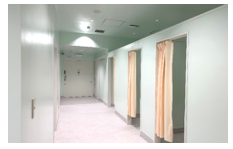
After the injection, you will need to rest in a designated waiting area for about 60 minutes while the tracer spreads throughout your body. During this time, you cannot use your mobile phone or read books. If you are unable to remain still, we may not be able to proceed with your scan. Both the examination room and
the waiting area are designed with a calming mint green theme.
■Scanning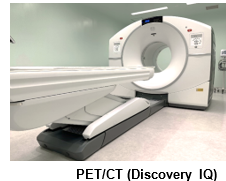
The imaging will be done using a PET/CT scanner, which combines a PET camera and a CT scanner. The scanning time is approximately 30 minutes.
■Waiting
After the scan, you will need to wait in a designated area for approximately 30 minutes until the radiation from the FDG in your body decreases.
■Payment
After all your scans are completed, the coordinator will guide you to the Accounts desk for your payment.
Q&A
▼Q&A About PET/CT Scans
About Scans
Q : What is a PET/CT scan?
A :
In a PET scan, a radioactive drug called a positron emitter is injected into the body and a PET scanner is used to take pictures of the radiation emitted from inside the body. Unlike CT or MRI scans, which show structural changes such as organ shapes, PET scans show functional changes such as organ metabolism (cell activity).
Q : Does a PET scan eliminate the need for other tests?
A :
A PET scan does not detect all types of cancer. Some cancers can be difficult to detect. Depending on the disease, it may be used in combination with blood tests, endoscopy, or ultrasound to make a more accurate diagnosis.
Q : Can all types of cancers be detected with a PET scan?
A :
The effectiveness of PET scans varies depending on the type of cancer. Very small cancers (less than 1 cm) are more difficult to detect the smaller they are. In addition, PET scans can also detect benign conditions, such as inflammation, because the tracer can be taken up by non-cancerous lesions. Not all abnormalities detected are malignant, and it can be difficult to distinguish between benign and malignant findings. A biopsy is often required to make a definitive diagnosis of cancer.
Q : Is the scan painful?
A :
There may be slight pain when the FDG is injected into a vein, but the scan itself is not painful. During the scan, you will be asked to lie on your back on the examination table for about 25 minutes. We will do our best to help you remain as comfortable as possible.
* Please note that a vasovagal reaction, such as a drop in blood pressure, may occur due
to nervousness during the injection. This is a temporary response caused by
stimulation of the vagus nerve. You will be informed about this before the scan.
Q : How long does the PET scan take?
A :
After an explanation of the procedure and a brief interview, you will change into a gown and receive the tracer injection. After the injection, you will rest for about an hour before the scan, which takes about 25 minutes. After the scan, there is a waiting period of about 30 minutes. If necessary, a second scan may be performed, which takes about 10 minutes. The entire process, from check-in to completion, takes about three hours.
Q : Can I move my body during the scan?
A :
You cannot move your body during the scan.
Q : I have claustrophobia. Can I stop the scan halfway through?
A :
If you have severe claustrophobia, you may not be able to undergo the scan. Please inform us in advance. The scan involves entering a tunnel-like device with a diameter of about 70 cm for approximately 30 minutes.
Q : I'm concerned about radiation exposure.
A :
The amount of radiation exposure from a PET/CT scan is approximately equivalent to 1- 4 times that of a barium swallow test, which is a low dose and not at a level that should cause concern. The FDG will go out of your body in several hours, so avoid close contact with infants, pregnant women, and breastfeeding women for several hours after the scan.
For More Information (Radiation Dose)
The radiation exposure from the FDG tracer used in PET scans is considered to be less than that from a stomach X-ray examination, at approximately 3.5 mSv. This is about 1/5 to 1/10 of the radiation exposure from a full-body CT scan. While PET/CT scans include radiation exposure from the CT component, there is no risk of radiation damage to the body.
For reference: Stomach barium X-ray: 4 mSv, Chest CT scan: 6 mSv, PET/CT: 10 mSv (according to data from Saku Central Hospital).
The administered tracer is very short-lived and is excreted through the urine, so it is mostly eliminated from the body within one day.
Q : How can I obtain more accurate test results?
A :
Excess tracer is excreted in the urine. Drinking plenty of sugar-free beverages, such as tea or water, before the test can help produce clearer images and reduce radiation exposure. For examinees with diabetes, it may be difficult to obtain clear images necessary for diagnosis if fasting blood glucose exceeds 200.
For Women
Q : Menstruation
A :
For women with menstrual periods, the timing of the test may affect the clarity of certain areas. Please contact us for further details.
Q : Breastfeeding
A :
Try to avoid breastfeeding immediately after the test. Breastfeeding should be avoided for 12 hours after the tracer injection. Consider expressing and storing milk before the test.
Q : Pregnancy
A :
As with other radiological tests, we do not recommend PET scans during pregnancy due
to the potential for radiation exposure to the fetus.
Before Scan
Q : Are there any precautions I should take from the day before the Scan
A :
From the day before the scan until it is completed, avoid strenuous exercise and physical labor, or similar activities. Excessive exercise may cause tracer accumulation in the muscles.
Q : Can I eat and drink on the day of the scan?
A :
Please finish your meal at least six hours before your appointment. Eating or drinking anything containing sugar or calories within six hours of the test may affect the results and could lead to rescheduling. This includes candy, gum, fruit, soup, juice, milk, and alcoholic beverages. You may drink sugar-free tea or water. There are no restrictions on water.
Q : Can I take my usual medication?
A :
If you have diabetes, stop taking your diabetes medication and insulin six hours before your appointment. Other medications prescribed by your physician can be taken as usual.
After Scan
Q : Are there any precautions after the scan?
A :
After the scan, to minimize radiation exposure to others, please avoid crowded places as much as possible. Also, try to limit contact with infants and pregnant women.
Other Information
Q : Could vaccinations or other medical tests affect a PET scan?
A :
Vaccinations
Vaccines may cause swelling in the lymph nodes, which can affect PET scan results.
Please schedule your PET scan at least two weeks after receiving a vaccination.
Barium Tests
Barium may interfere with CT images. Please schedule your PET scan at least
one week after a barium test.
Nuclear Medicine Tests
Residual radiation from nuclear medicine tests may affect PET scan results.
It is recommended to undergo the PET scan first and schedule the nuclear medicine test on a different day.
Bone Density Tests
Residual radiation from a bone density test may affect PET scan results.
It is recommended to undergo the bone density test before the PET scan.
Contrast-enhanced CT Scans
Residual contrast agent may affect PET scan results.
Please schedule your PET scan either the day before or the day after your contrast- enhanced CT scan.
Endoscopy
Inflammation at the test site may cause FDG uptake. If you have an endoscopy on the same day, we will provide a report that takes this into account
Bronchoscopy
Please schedule your PET scan at least one week after a bronchoscopy.
Biopsy
Please schedule your PET scan at least one week after a biopsy.
Q : I don't speak Japanese. Can I still take the scan?
A :
If you do not speak or read Japanese, please come with someone who can assist you in Japanese.
▼Q&A About MRI Scans
Q : Why does an MRI scan make loud noises?
A :
To obtain information about the position of internal organs, an MRI scan requires a "gradient magnetic field," which involves changes in the strength and direction of the magnetic field. The coils inside the MRI machine vibrate due to the strong forces generated when the magnetic field switches rapidly. This results in various loud sounds, such as "bang bang bang," "beep beep beep," or "da da da," depending on the scanning method.(Japan Medical Imaging and Radiological Systems Industries Association
出典:一般社団法人日本画像医療システム工業会企画JESRA「MRIのQ&Aより」
Q : How is a head MRI different from a head CT
A :
A head MRI uses magnetism, while a CT scan users radiation (X-rays), which involves exposure to radiation. In general, MRI provides higher resolution than CT and allows for a more detailed evaluation of brain conditions. Additionally, MRI can easily capture images of major blood vessels without the use of contrast agents.
However, MRI does not provide much information about bones. CT is useful for detecting abnormalities such as brain hemorrhages or skull fractures.
Q : How long does an MRI scan take?
A :
This brain screening includes only a head MRI and takes about 20 minutes.
Q : Can I move my body during the scan?
A :
Please remain as still as possible and lie quietly throughout the scan.
Q : What should I do if I feel unwell during the scan?
A :
You will be given a call button. If you feel unwell, please press it without hesitation.
Important Notes for Head MRI + PET/CT Cancer Screening
| Before the Scan | If any of the conditions under “Not Eligible or Not Suitable” apply to you, please inform us in advance. |
|---|---|
| Avoid strenuous exercise or heavy physical labor from the day before the scan until it is completed. | |
| If you are taking medication for diabetes, please write the name of the medication in the designated space. | |
| On the day of the Scan | For the PET/CT scan, you must fast for six hours before your scheduled appointment time. You may drink water, but beverages containing sugar are not allowed. |
| If you are taking diabetes medication or undergoing insulin therapy, stop taking it six hours before your scheduled appointment time. | |
| Please wear clothing without metal, accessories, or metallic components as much as possible. | |
| Do not wear makeup, nail polish, or colored contact lenses. | |
| If you do not understand Japanese, please bring an interpreter with you. | |
| After the Scan | After the scan, avoid crowded places as much as possible for one to two hours. |
| Drink plenty of fluids. | |
| On the day of the scan, men should sit while urinating. |
If you are eligible for the following, please read the relevant sections carefully
| Diabetic Patients | ・If your glucose level is 200 mg/dL or over before the PET/CT scan, the scan may not be conducted. |
|---|---|
| ・Please remove your insulin pump and continuous glucose monitor before the scan, and bring new ones with you. Confirm with your diabetes specialist whether it is safe to remove these devices for approximately one hour. | |
| Home Oxygen Therapy | Please use your own oxygen tank. Make sure you bring enough oxygen to last until you return home. |
| Implanted Medical Devices |
If you have a pacemaker or ICD, please inform us in advance. Please bring your pacemaker and ICD (Implantable Cardioverter Defibrillator) identification certificate. |
Contact Us
 Division of International Medical Service Promotion
Division of International Medical Service Promotion
Nippon Medical School Chiba Hokusoh Hospital
E-mail: hok-impact@nms.ac.jp (Japanese,English,Chinese)
TEL: 0476-99-1111 (Main Number)
FAX:0476-99-1922
Consultation Hours
Mondays to Fridays 8:30 a.m. to 4:00 p.m.
Saturdays 8:30 a.m. to 3:00 p.m.
Closed days of regular service:
Sundays, National holidays,
From December 30th to January 4th,
Foundation Day (April 15th) or its rescheduled date



